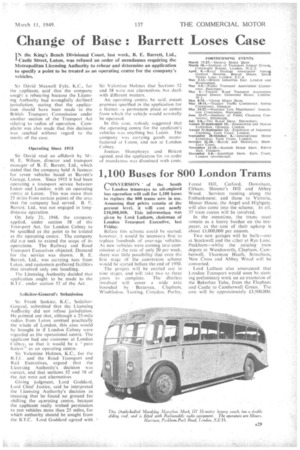Change of Base : Barrett Loses Case
Page 5

If you've noticed an error in this article please click here to report it so we can fix it.
IN the King's Bench Divisional Court, last week, B. E. Barrett, Ltd., I Castle Street, Luton, was refused an order of mandamus requiring the Metropolitan Licensing Authority to rehear and determine an application to specify a point to be treated as an operating centre for the company's vehicles.
Sir David Maxwell Fyfe, K.C., for the applicant, said that the company sought a rehearing because the Licensing Authority had wrongfully declined jurisdiction, stating that the application should have been made to the British Transport Commission under another section of the Transport Act relating to radius of operation. Complaint was also made that this decision was reached without regard to the merits of the case.
Operating Since 1915 Sir David read an affidavit by Mr. H. E. Wilson, director and transport manager of B. E. Barrett, Ltd., which stated that the company held A licences for seven vehicles based at Barrett's Garage, Luton. Since 1915 it had been operating a transport service between Luton and London, with an operating centre at Luton. This was more than 25 miles from certain points of the area that the company had served. B. E. Barrett, Ltd., was not engaged, in longdistance operation.
On July 21, 1948, the company applied, under section 58 of the Transport Act, for London Colney to be specified as the point to be treated as the operating centre. The company did not seek to extend the scope of its operations. The Railway and Road Transport Executives objected. Demand for the service was shown. B. E. Barrett, Ltd., was carrying hats from Luton, and customers preferred facilities that involved only one handling.
The Licensing Authority decided that application ought to be made to the B.T.C. under section 52 of the Act..
Solicitor-General's Submission Sir Frank Soskice, KC.. SolicitorGeneral, submitted that the Licensing Auttority did not refuse jurisdiction. He pointed out that, although a 25-mile radius from Luton omitted practically the whole of London, this area would be brought in if London Colney were regarded as the operational centre. The applicant had one customer at London Colney, so that it would be a " pure fiction " as an operating centre.
Sir Valentine Holmes, K.C:, for the 13.1.,C. and the Road Transport and Rail Executives, argued that the licensing Authority's decision was correct, and that 'sections 52 and 58 of the Act were not alternatives
Giving judgment, Lord Goddard, lord Chief Justice, said he interpreted the Licensing Authority's decision as meaning that he found no ground for shifting the operating centre, because the applicant really wished permission to run vehicles more than 25 miles, Tor which authority should be sought from the B.T.C. Lord Goddard agreed with Sir Valentine Holmes that Sections 52 and 58 were not alternatives, hut dealt with different matters.
An operating centre, he said, meant premises specified in the application for a licence" a permanent place 'orcentre From which the vehicle would normally be operated.
In this case, nobody suggested that the operating centre for the applicant's vehicles was anything but. Luton. The company was carrying goods manufactured at Luton, and not at London C ol ney.
Justices I Itunphreys and Birkett agreed, and the application lot an order of mandamus was dismissed with costs.


























